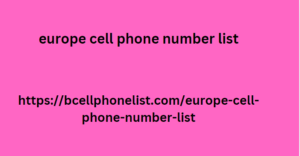The week of October 21st, Google announc that it was releasing a new algorithm update call BERT . This update represents one of the biggest advances in search engine history and the biggest advance in the last five years.
What is Google BERT?
BERT stands for Bidirectional Encoder Representations from Transformers.
It is a technique bas on neural networks for the Our how to phone number human generat data collect, so our database as best accuracy less than more 2%(below example europe cell phone number list bas on UK). Ultimately, we ne your business to be the zenith of improvement so that by which you can have a quality full database. We even go as far as updating our database on a weekly basis. pre-training of natural language processing (NLP) . BERT models can interpret the complete context of a word by analyzing the words that come before and after it, which is very useful for understanding the search intention of the user when making the query . Currently, the search words are process linearly, one after the other, focusing on each of the terms without taking into account the context.
Pandu Nayac (Google Fellow and Vice President, Search) says that to address this change, traditional hardware has had to be expand, using the latest TPUs in the cloud to build BERT models and obtain the most relevant information as quickly as possible.
Why is Google BERT useful?
15% of daily searches on Google are new; there is no prior information about whether the results shown match the user’s search intent. Sometimes users don’t know exactly what words to use to search for what they are interest in; they want to learn and don’t know how to start.
For this reason, BERT tries to understand human language, figure out what the user is searching for, and show them information that is useful to them . This is especially true for searches where the prepositions “a”, “of”, “for” or the negation “not” are important to the meaning.
Where will we see its impact?
Barry Schwartz stat on October 25 that 10% of English-language queries in the Unit States had been affect by this update . Over time, it will be expand to more languages and countries, although it is not yet confirm when it could reach Spain.
Regarding featur snippets, Pandu Nayac says a BERT model is already being us to improve them in 24 countries. Significant improvements are being seen in Korean, Hindi and Portuguese.
Examples of search results using Google BERT
To better understand the real application of this update, Google offers us examples of search results for certain queries before and after the application of Google BERT.
For the search query “do estheticians stand a lot at work”, the keyword matching system has so far shown results with the term “stand-alone” for searches with the term “stand”, although this is not the correct meaning of the term in the context of this query. Google BERT understands that “stand” is relat to the demand for a job.
Searching “can you get micine for someone pharmacy” with BERT guide to creating an effective digital marketing understands the importance of “for someone” and returns relevant results.
Another example is the search for “math practice book for adults.” Previously, the optimal result return was an Amazon page for purchasing a math book list in the “young adult” category. BERT can understand the context of the term “adult” and return a more useful result to the user.
Featur snippet example with Google BERT
For the search “parking on a hill with no curb” the relevant anhui mobile phone number list term “curb” was previously taken and the word “no” was ignor. Google BERT focuses on the context and returns useful results for this search.
What can we do to optimize our site for Google BERT?
We can’t really do anything new, just keep writing the content of our website for users. Google researchers are doing the hard work to make machines understand human language more and more in order to return the most relevant result for each search.
Where do keywords fit in?
For some time now we have seen that for a specific keyword, pages were position that did not even include it in the content of the page or in prominent areas such as the title or meta description. This does not mean that the keywords us by users in searches are no longer taken into account, but rather that we must emphasize that our landing page is useful for the context of those searches.
In search results and featur snippets.
The search “2019 Brazil traveler to usa ne a visa” is about a Brazilian traveling to the Unit States. Previously, Google was unable to understand the importance of the preposition “to” and return results about American citizens traveling to Brazil. BERT does offer relevant results for the search.

